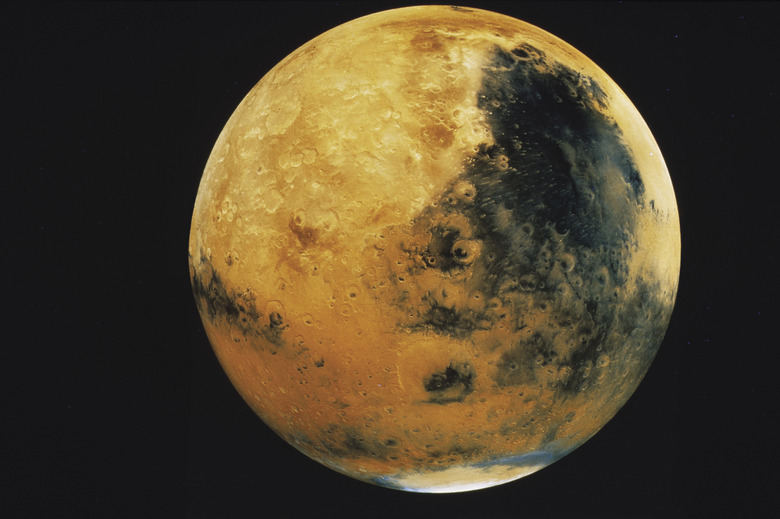Does Mars Have A Greenhouse Effect?
For over a century, science-fiction writers and scientists alike have speculated about someday colonizing Mars. One of the many problems with this idea, however, is the frigid Martian climate. Mars is much colder than Earth, not only because it's farther from the sun but because its thinner atmosphere does not support a strong greenhouse effect.
The Greenhouse Effect
The Greenhouse Effect
When visible light from the sun strikes the surface of Mars, it's absorbed and converted to heat. The planet re-radiates some of this heat into space in the form of infrared radiation. Greenhouse gases such as CO2 are transparent to visible light but absorb strongly in the infrared part of the light spectrum. The gases act as a blanket that traps the heat and raises the temperature. This effect is similar to greenhouse glass, which keeps the air warm inside.
Gases in the Martian Atmosphere
Gases in the Martian Atmosphere
The Martian atmosphere is more than 95 percent CO2 by volume. The remaining gases are a mixture of nitrogen, argon, oxygen and carbon monoxide. CO2 is a potent greenhouse gas, so Mars does have a greenhouse effect. But it's very weak because the Martian atmosphere is so thin — 100 times less dense than the Earth's atmosphere.
A Historical Greenhouse Effect on Mars?
A Historical Greenhouse Effect on Mars?
Some scientists have speculated that Mars once had a stronger greenhouse effect. In 1971, for example, data from the Mariner 9 spacecraft showed that the surface temperature on Mars increased significantly during a dust storm, which temporarily trapped more heat near the planet's surface. Astronomer Carl Sagan pointed out that under the right conditions, a sufficient increase in surface temperature would melt the Martian polar ice caps. This was possible because Martian clouds are made of frozen CO2. When heated sufficiently, the CO2 would thicken the atmosphere and contribute to further warming. Sagan and other astronomers speculated that events of this kind might have occurred earlier in the Red Planet's history.
Making Mars More Livable
Making Mars More Livable
Currently, the greenhouse effect on Mars is very weak. However, some scientists wonder whether it is possible to make Mars more habitable by thickening its atmosphere. This approach, they say, might create a stronger greenhouse effect and make Mars a warmer planet. Because it's not clear how much CO2 the Martian polar caps contain, scientists aren't sure how much additional CO2 would be needed to warm the Martian surface. Other possibilities include adding different greenhouse gases such as perfluorocarbons (PFCs) to the atmosphere.
Cite This Article
MLA
Brennan, John. "Does Mars Have A Greenhouse Effect?" sciencing.com, https://www.sciencing.com/mars-greenhouse-effect-1914/. 24 April 2017.
APA
Brennan, John. (2017, April 24). Does Mars Have A Greenhouse Effect?. sciencing.com. Retrieved from https://www.sciencing.com/mars-greenhouse-effect-1914/
Chicago
Brennan, John. Does Mars Have A Greenhouse Effect? last modified August 30, 2022. https://www.sciencing.com/mars-greenhouse-effect-1914/
